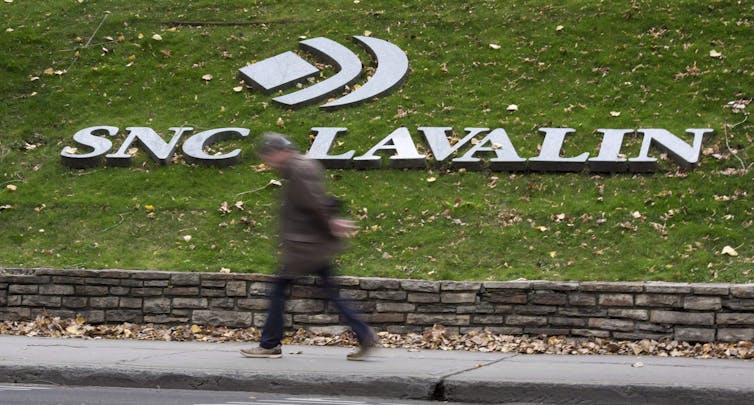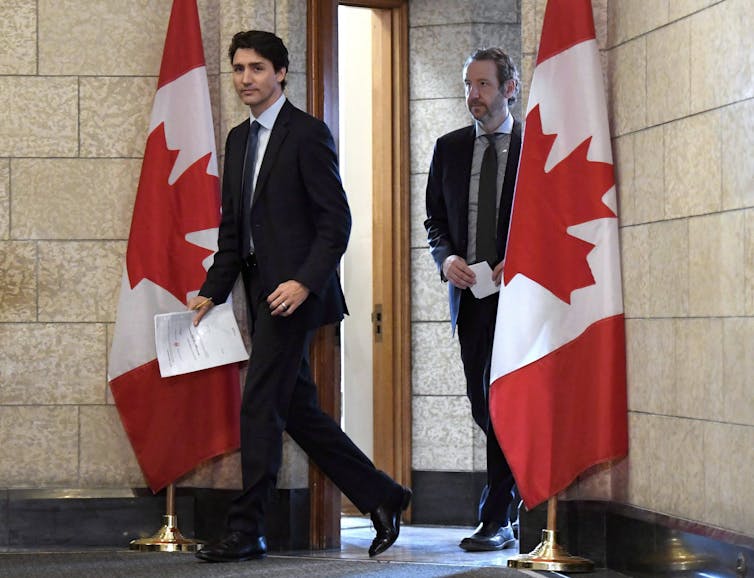Leaders' debate: Trudeau defends efforts to save SNC-Lavalin jobs. He's right.

Bill Flanagan, Queen's University, Ontario
Justin Trudeau used the English-language leaders’ debate to defend his position on the SNC-Lavalin affair, standing up to a withering attack from the other leaders by saying he was advocating for Canadian jobs.
“The role of the prime minister is to stand up for Canadian jobs, to stand up for the public interest and that’s what I’ve done,” Trudeau said in response to an attack from Conservative Leader Andrew Scheer, who accused him of interfering in a court case regarding SNC-Lavalin.
“That’s what I’ll continue to do every single day.”
But even though there is good reason to criticize Trudeau for his handling of the SNC-Lavalin file, on the matter of saving jobs, he has it right.
SNC-Lavalin has a good case for a deferred prosecution agreement, known as a DPA, and Trudeau was within his rights to request, on the grounds of public interest and “saving jobs,” that former attorney general Jody Wilson-Raybould reconsider the decision to deny one.
Indeed, supporting deferred prosecutions where appropriate can not only help save jobs, it can also advance the detection and punishment of bribery in Canada.
The public interest
Central to this debate is an amendment added to the Criminal Code in 2018, whereby a prosecutor may enter into negotiations for a “remediation agreement” (a DPA) with a company to stay criminal proceedings against it if it’s in the public interest to do so. A DPA would, among other things, require a company to admit to the wrongdoing, identify those in the company responsible and pay a hefty fine.
Rather than a get-out-of-jail-free card, the Criminal Code states that the purpose of a DPA is to denounce the company’s wrongdoing, advance respect for the law, encourage voluntary disclosure of the wrongdoing and — of greatest relevance to Trudeau’s position — reduce “the negative consequences of the wrongdoing” for innocent people who didn’t engage in any wrongdoing. That includes “employees, customers, pensioners and others.”
Read more: SNC-Lavalin: Deferred prosecution deals aren't get-out-of-jail free cards
DPAs have been highly effective in other countries in rooting out bribery, most notably in the United States.
When companies come across internal evidence that a bribe may have taken place, they’re then encouraged to report it to the authorities in the hope that the company might be able to secure a DPA and avoid criminal prosecution.
But DPAs aren’t easy. They usually require a company to undertake, at the direction of prosecutors, an expensive and lengthy internal inquiry to get to the bottom of the corruption and introduce costly measures to reduce any likelihood of reoffending, in addition to paying a fine.
According to a recent study by the Organization for Economic Cooperation and Development (OECD), self-reporting by companies is the most important single source of detection for foreign bribery, accounting for the detection of 22 per cent of cases.
Police investigations account for less than five per cent. And 100 per cent of the self-reported cases resulted in a sanction against the company, compared to 65 per cent or less for other sources of detection.
Self-reporting works
In other words, self-reporting works remarkably well to detect and punish bribery, much better than any RCMP investigation or criminal prosecution possibly could. But it’s dependent upon the availability of DPAs. Without the possibility of a DPA, there is obviously little incentive for a company to self-report.
In 2015, SNC-Lavalin was charged with a spectacular level of bribery and corruption in Libya that had taken place from 2001 to 2011. SNC-Lavalin actively lobbied for DPA amendments to the Criminal Code, and when enacted in 2018, the company sought to negotiate one.

However, the country’s Director of Public Prosecutions denied the request. The prime minister than asked Wilson-Raybould reconsider the matter, which the attorney general is entitled to do, but she declined.
The reasons for the denial have never been made public. But it appears SNC-Lavalin’s request was denied because the prosecutor believed the company had not come forward with voluntary disclosure when the bribes were first discovered around 2012. The company maintains that it fully co-operated with the RCMP investigation from the outset.
It’s also relevant to note that a DPA, only introduced into law in 2018, was not even available to the company in 2012. Nonetheless, the company still maintains it co-operated with the investigation.
Other factors for the denial include the severity of the bribery in question and the degree of involvement of senior officials.
Saving jobs
But these aren’t the only factors the prosecutor must consider.
As noted, the Criminal Code also provides that a purpose of a DPA is to reduce “the negative consequences” on innocent stakeholders who will be harmed if the company’s reputation is so damaged by a criminal conviction that it’s brought to the verge of bankruptcy or worse.
This brings us to Trudeau’s reiteration in the debate that he was only advocating for saving Canadian jobs when he pressed Wilson-Raybould to reconsider a DPA for SNC-Lavalin. In doing so, he acted in a manner consistent with the Criminal Code’s provisions that permit the prosecutor to consider the impact on innocent stakeholders.

However, in one final wrinkle, the Criminal Code also provides that the prosecutor must not consider “national economic interest” when considering whether a DPA is in the public interest. Some have argued this provision precludes the prosecutor, and the prime minister, from even considering the impact on Canadian jobs. However, this is a misreading of this provision.
The reference to “national economic interest” is drawn from the 1997 OECD Anti-Bribery Convention that indicates the prosecution of bribery “shall not be influenced by considerations of national economic interest.” Canada, a party to the Convention, introduced its anti-bribery laws in 1998. When enacting the DPA provisions in 2018, this phrase from the Convention was also included.
At the time of the Convention, some countries were of the view that the payment of bribes was in their national economic interest because bribes would help domestic companies land major international contracts. For these countries, bribes were simply a cost of doing business.
Forbid paying bribes
The Convention was intended to change all this and expressly prohibits the payment of bribes to foreign officials regardless of any “national economic interest.” For this reason, the Convention prohibited the consideration of national economic interest when prosecuting bribery.
However, the Convention said nothing about DPAs. That’s because they were a practice that evolved long after 1997, starting primarily in the United States.
Read more: Banks behaving badly: HSBC settles in money laundering probe
In particular, there is nothing in the Convention that precludes considering saving jobs when it comes to weighing the merits of a DPA request.
It’s therefore wrong to argue the Criminal Code prevented Trudeau from even raising his concerns about the public interest and innocent company stakeholders.
The Criminal Code specifically identifies innocent stakeholders as a legitimate factor. And there is nothing in the Convention that prevents the consideration of innocent stakeholders when weighing a DPA request.
In other words, “national economic interest” in the Criminal Code means that a prosecutor cannot offer a DPA, and go easy on a company, because bribes are “good for business.” Prosecutors can, however, consider jobs when weighing the merits of a DPA request.
In fact, the potential impact on innocent stakeholders is a common reason why prosecutors in countries like the U.S. negotiate DPAs.
Canadian officials should too.
Bill Flanagan, Professor of Law, Queen's University, Ontario
This article is republished from The Conversation under a Creative Commons license. Read the original article.